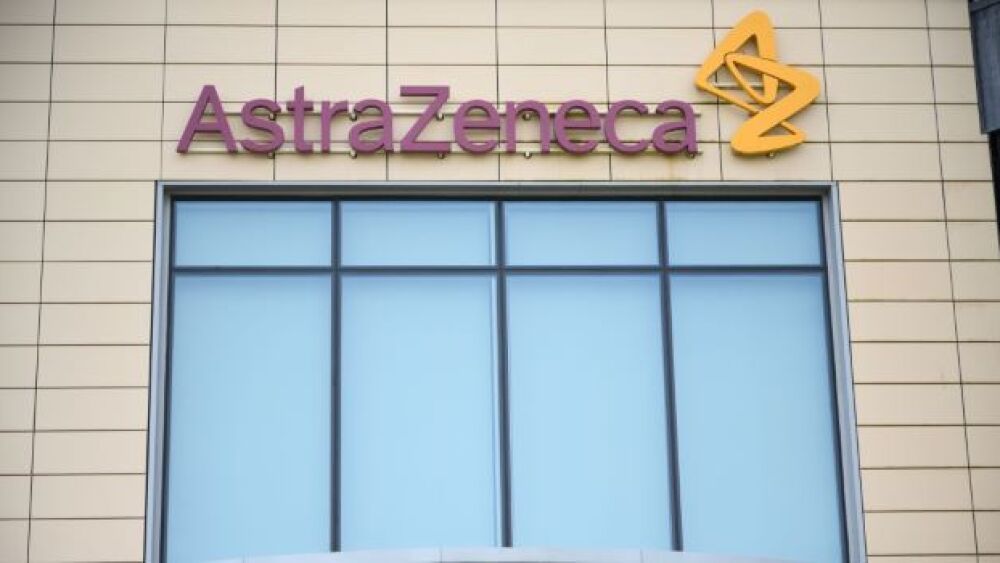AstraZeneca will showcase its early oncology portfolio at the American Association for Cancer Research set to begin on April 8.
Leon Neal/Getty Images
AstraZeneca will showcase its early oncology portfolio that it believes has the potential to transform the oncology treatment landscape at the upcoming American Association for Cancer Research (AACR) conference.
The company will highlight its portfolio of potential oncology drugs in 60 different presentations at the conference. The presentations include data from three experimental medications that AstraZeneca said illustrates its innovative approach to the design of molecules addressing challenging approaches to treatment, including the targeting of complementary mechanisms. The experimental drugs include immuno-oncology programs, as well as antibody-drug conjugates and DNA damage response (DDR) assets.
AstraZeneca said the clinical data presented from its immuno-oncology and DDR assets illustrate the potential of the company’s next-wave medicines to advance oncology treatments. Additionally, the U.K. pharma giant said it will showcase data from novel molecules that show promising anti-cancer activity and an ability to tackle tumors from multiple angles.
Assets that AstraZeneca will showcase include MEDI5752, a novel bispecific antibody, that simultaneously targets the immune checkpoint proteins PD-1 and CTLA-4. AstraZeneca will also present data from the Phase I PETRA study that is assessing AZD5305, a next-generation PARP1-selective inhibitor in patients who have tumors that harbor specific homologous recombination repair gene mutations. Also at AACR, AstraZeneca will share the first preclinical data for AZD8205, a novel ADC that targets B7-H4, a protein that is overexpressed in multiple solid tumors. AZD8205 is the first ADC that uses the company’s proprietary linker technology. AstraZeneca said the data will demonstrate its progress in establishing in-house ADC expertise and becoming a leader in the field.
“We are serious about leading a revolution in oncology, which is why we continue to pioneer new ways to target cancer earlier and with greater precision, for the benefit of patients. Our data at AACR from next-wave Immuno-Oncology medicines, PARP inhibitors and antibody drug conjugates demonstrate the potential of our diverse portfolio and reflect our vision to target cancer from every angle,” Susan Galbraith, PhD, executive vice president of oncology research and development at AstraZeneca said in a statement.
AstraZeneca will be joined at AACR by numerous other companies. BioSpace takes a look at some of the presentation plans of these companies in a lead-up to the conference set to begin on April 8.
Gadeta BV – Netherlands-based Gadeta, which is developing gamma delta T-cell receptor (TCR)-based immunotherapies, will present data related to its lead TCR-based T cell therapy candidate GDT002, which has been in a Phase I/II study . The company said GDT002 has demonstrated a potent anti-tumor activity across a broad spectrum of solid and liquid tumor types. Gadeta is also initiating IND-enabling studies for GDT201 in colorectal cancer.
“Broad application of cell therapies like CAR-T have been hampered by a lack of tumor-specific targets. Gadeta leverages the natural HLA-independent tumor recognition capabilities of γδTCRs combined with the proliferative capacity and robust tumor killing of αβT cells to develop tumor-specific cell therapies,” Mark Throsby, PhD, chief scientific officer of Gadeta said in a statement.
Ascletis – China’s Ascletis will present preclinical data from two novel anti-cancer drug candidates, ASC61, an oral PD-L1 inhibitor and ASC60, an oral fatty acid synthase (FASN) inhibitor.
Preclinical data showed ASC61 demonstrated significant antitumor efficacies and was well-tolerated in mouse models. The company said it will enroll its first patient in a Phase I study in the second quarter of this year. In preclinical studies, ASC60 also saw positive results. Data showed ASC60 could suppress tumor growth and enhance the antitumor activities of mPD-1 antibody in tumor mouse models. The company applied for a Phase I study for this asset in China.
Nimbus Therapeutics – Cambridge, Massachusetts-based Nimbus will present preclinical data from its Casitas B-lineage lymphoma b program at AACR. Data from studies of NTX-801, a Cbl-b inhibitor, showed that the asset enhances cytokine responses in an in vivo PD model. Also, the company said, in a syngeneic mouse model, NTX-801 demonstrated tumor growth inhibitory activity.





